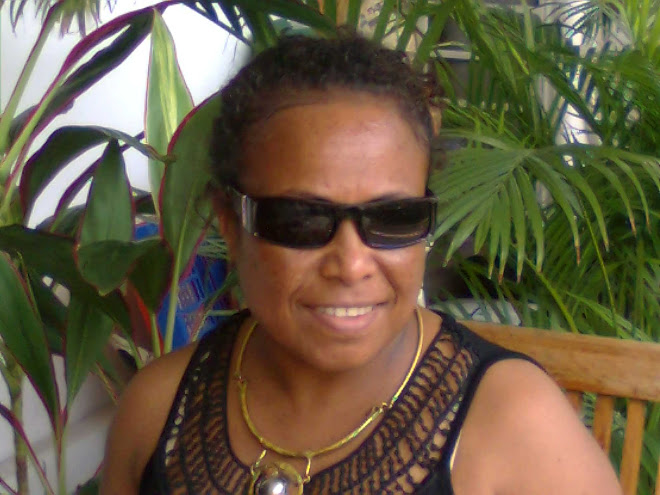I come from Alotau; in fact, my tribe owns Alotau and are leasing it out to the Govt. The guy who claims Alotau to be his is not the owner of the land but I am keeping my cool because I want Alotau to develop and my people to better themselves. However, I am disappointed at how companies that come into the Province arrive with good intentions but end up not helping the people at all.
The companies that come into the Province extract raw materials without proper plans on how the people will survive after they are gone. For example, the Misima gold mine has taken out at least 18.1 tonnes of gold leaving the people shocked of their new life style. Even though the company have improved the Misimans standard of living, improved health care and education, it still left loopholes. Those that could not work in the mine anymore had to go to other parts of the country to work with the experience they gained but this is not good socially.
The other company was Ulabo Timber Company, which was supposed to operate on a sustainable basis but so far very little has happened. The roads they built were for the logs to be taken out and when that was done they left with pockets full leaving the locals with very little. The company had plans of venturing into downstream processing of timber, and establishing a timber terminal in the area to service the province but that has not happened.
I have heard of a timber project in the town of Kumasi in Western Province run by a Malaysian company that is mistreating locals. According to Greenpeace, Rimbunan Hijau – a Malaysian company - continues to operate in secrecy regarding the true extent of their logging and other business interests. They have 60 interlinked companies that are registered in Papua New Guinea and these companies control 50% of Papua New Guinea’s large–scale commercial logging operations and at least 55% of log exports .
Such projects are good but there has to be good plans out lined for the later generations. We should not be blinded with get rich quick mentality. A lot of the village people do not understand most of the happenings outside of their villages and so when businesses come in looking to start businesses they agreed too quickly. A parcel of land in my area was directly acquired by a company for K25,000 to start up a business, which I know should have been leased through the Government; however, that old man is now penniless and is currently working for the same company as a cleaner.
I have travelled around a bit and have not come across land being sold for that amount. In most countries, land is sold in millions; only houses are sold in thousands. Land has great value. Another businessman was nagging my uncle to see if he could buy logs from his land, till I mentioned to him that a tree is worth US$193,250 . Furthermore, my father allowed some mining company to store their goods such as speed boat, generators etc in his land for K3 a day and he is paid every two months. It’s causing social problems as it attracts thieves, disputes etc. Also someone had sold/rented their land in Alotau and has asked my dad if they could do gardening in his land. However, my father’s tribe do subsistence gardening in this area so if this guy comes to do gardening it will create more problems.
This kind of business is not sustainable and fair; it is using people for one’s benefit. There are consequences on this kind of behaviour resulting in one party reacting to either the landowner or the developer being pushed out. Is this the kind of development we want or are there more sensible people out there? I as a Papua New Guinean accept that there has to be development, but could it not be done in a way that is sustainable and fair?
A Tibetan humanist has warned us in the most eloquent manner what we might be doing wrong in our incontrollable development frenzy:
When all trees would have been cut…
When all rivers and lakes would have dried up…
When all other species would have silenced their voices forever…
We would have come to realize that…
We can’t eat money.
We need visionary leaders who are able to say no to corruption and stand on their feet and govern the people of Papua New Guinea. The people of Papua New Guinea are intelligent and well educated. We have always stood together in unity; we can fight to bring our country to survive sustainably.
Resources:
http://www.forestry.gov.pg/site/index.php
http://alotauenvironment.blogspot.com/2005/06/png-forests.html
http://www.natural-resources.org/minerals/development/docs/pdfs/misimacasestudy.pdf
http://www.mining-technology.com/projects/misima/
Greenpeace: The Untouchables
Professor T.M. Das of the University of Calcutta came up with a price tag for a tree, in an effort to satisfy sceptical economists about the value of letting a native forest live: the price was US$193,250. This amount was reached through the following bookkeeping for a tree living for 50 years:
Generates oxygen worth - US$ 31,250
Controls air pollution for - US$ 62,000
Reduces soil erosion and increases soil fertility for - US$ 31,250
Recycles water worth - US$ 37,500
Provides a home for animals worth - US$ 31,250
Total US$ 193,250
See: http://www.pecc.org/community/papers/ecotourism-china-2004/oswaldo-munoz.pdf
Subscribe to:
Post Comments (Atom)








No comments:
Post a Comment
Note: only a member of this blog may post a comment.